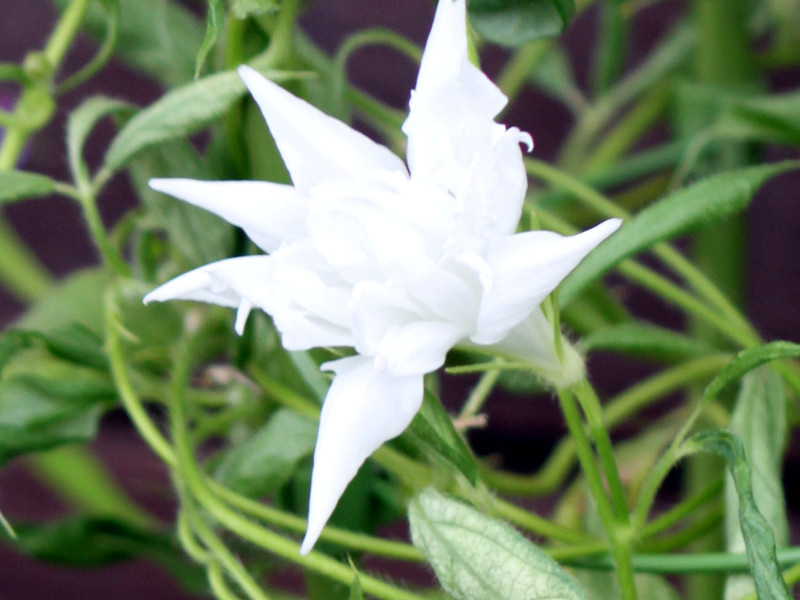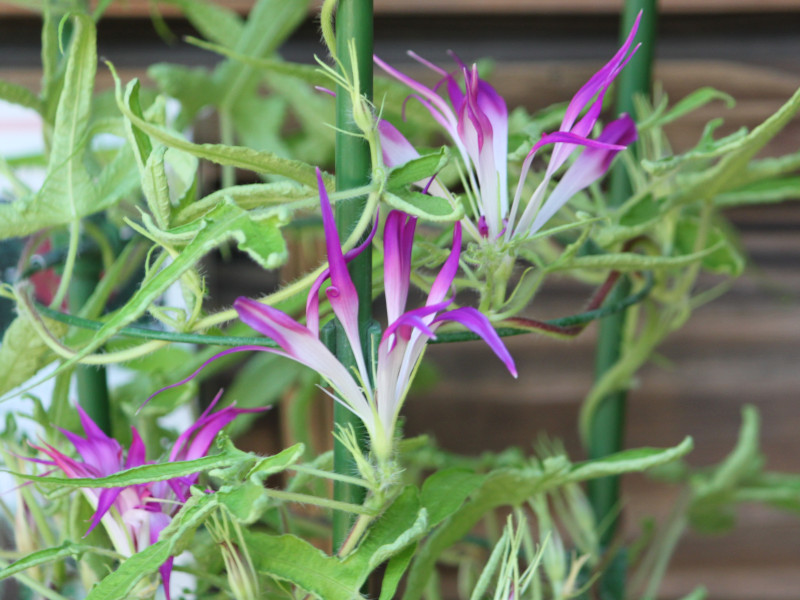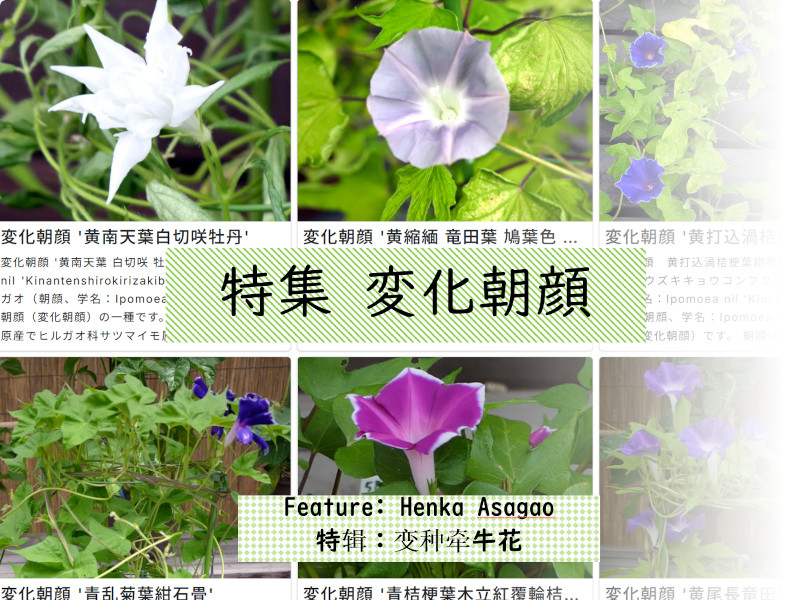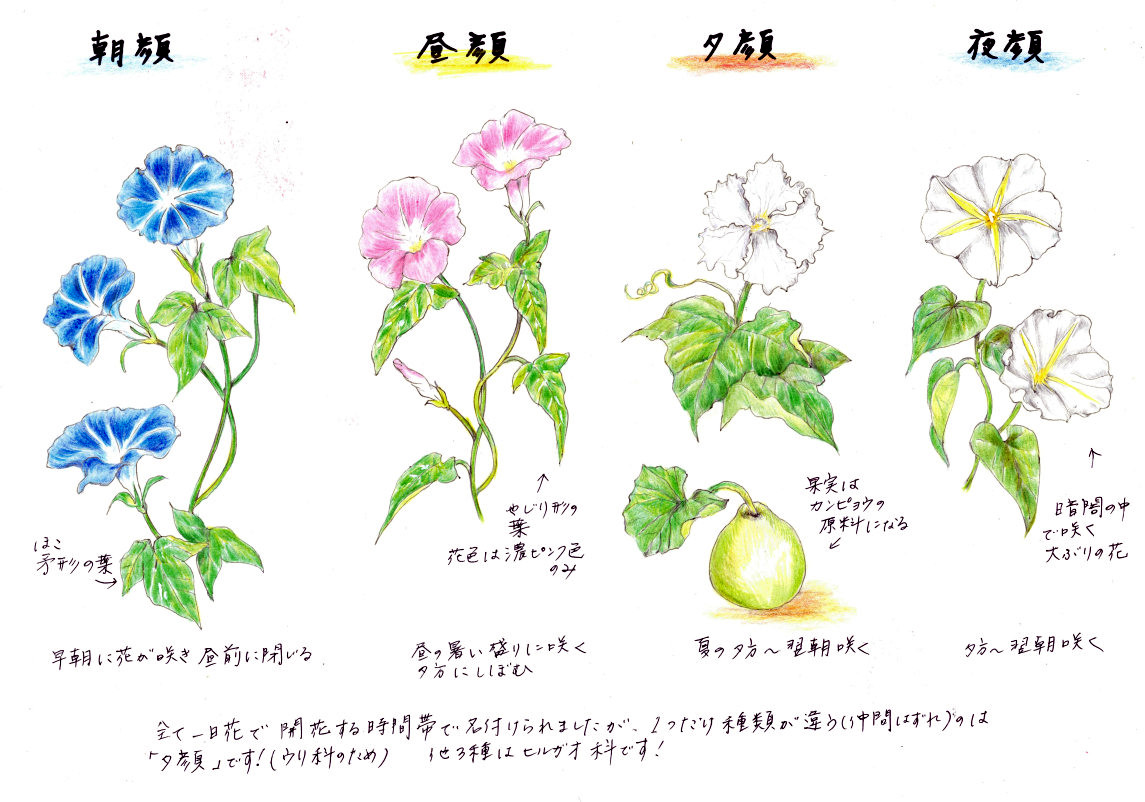Morning Glory
- Flower nameMorning Glory
- Scientific namePhabitis nil
- AliasMorning Glory, 朝顔, 牽牛花
- Place of originTropical Asia
- Place of floweringGarden, Potted flower
- Flowering seasonJune, July, August, September, October
- Language of flowersBonds of affection
What is Morning Glory
Here, we introduce the Morning Glory and its varieties.
Variegated Morning Glory
Among morning glories, there are unique varieties known as Variegated Morning Glories.


Unique varieties of Morning Glory. Left: 'Kinan Tenba Shiro Botan', Right: 'Ki-jaku Houkeisokuryouha Beniiro Botan'
“Variegated Morning Glory” – The Eccentric Among Morning Glories
These morning glories have unusually shaped or colored flowers and leaves. They have a captivating charm.

Featured: Variegated Morning Glory
Morning Glory (Ipomoea nil) is a climbing annual vine native to tropical Asia and belongs to the bindweed family, Convolvulaceae, genus Ipomoea.
It is also called "Kengyuka" in Japanese and "Japanese Morning Glory" in English.
It is commonly used in gardens and educational settings.
The vine length ranges from 100 to 300 cm, and it is grown with supports to enjoy its flowers.
The leaves are lance-shaped, with smooth edges, and grow alternately.
From June to October, it blooms trumpet-shaped flowers early in the morning from a dichasium and wilts before noon.
The flower diameter is 5–20 cm. The original flower color is pale blue, but numerous cultivars now exist in pale blue, blue, violet, reddish purple, red, pink, and white.
It has 3 carpels and 5 stamens.
After blooming, the carpels form a dry capsule.
Origin of the Name
The Japanese name "Asagao" (Morning Face) comes from the fact that it blooms in the morning and closes by the afternoon.
The genus name Ipomoea comes from Latin ipo (worm) + homoios (like), referring to its twining habit.
The species name nil means “indigo,” representing the typical flower color.
Flower Language
Its symbolic meaning is “bonds of affection,” derived from how its vines cling tightly.
Which belongs to a different family?
A common question is: Among "Asagao" (Morning Glory), "Hirugao" (Bindweed), "Yugao" (Bottle Gourd), and "Yorugao" (Moonflower), which belongs to a different family?
Answer:
Ipomoea nil (Asagao) = Convolvulaceae, genus Ipomoea
Calystegia japonica (Hirugao) = Convolvulaceae, genus Calystegia
Lagenaria siceraria var. hispida (Yugao) = Cucurbitaceae, genus Lagenaria
Ipomoea alba (Yorugao) = Convolvulaceae, genus Ipomoea
Thus, Morning Glory, Bindweed, and Moonflower are all in the same family, but Bottle Gourd is from a different one.
So the answer is: Yugao.
Yugao produces kampyo, used in sushi rolls.

From left to right: Morning Glory, Bindweed, Bottle Gourd, Moonflower
Haiku Featuring Morning Glory
Asagao ya / Tsurube torarete / Morai mizu
– Poet: Chiyo-ni (Kaga Chiyo)
General Information
Common name: Morning Glory
Scientific name: Ipomoea nil
Synonym: Phabitis nil
Other names: Japanese Morning Glory, Kengyuka
Classification: Kingdom Plantae, Angiosperms, Eudicots, Order Solanales, Family Convolvulaceae, Genus Ipomoea, Species nil
Origin: Tropical Asia
Type: Climbing annual vine
Vine length: 100–300 cm
Leaf shape: Lanceolate, edge entire, alternate phyllotaxy
Blooming period: June–October
Inflorescence: Dichasium
Flower shape: Trumpet
Flower diameter: 5–20 cm
Carpels: 3
Stamens: 5
Flower colors: Pale blue, blue, violet, reddish purple, red, pink, white
Fruit: Capsule
Seed color: Black
Related Pages
Morning Glory (Ipomoea nil)
Feature: Variegated Morning Glories


















